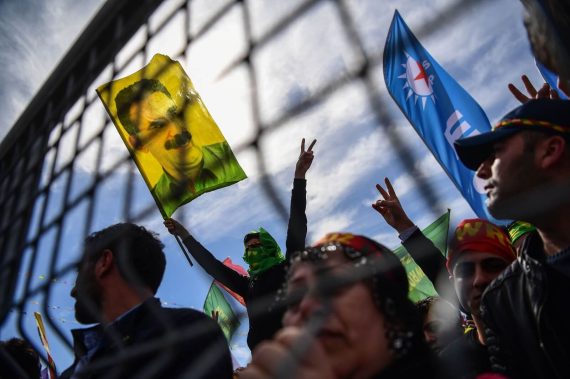Besides some bilateral consultations with its NATO ally, the U.S., Turkey is preparing for a strike against the PKK’s Syria branch, known as the PYD/YPG. Whether this will happen in the near future or not, the Turkish government is determined to utilize its diplomatic and military capacities in order to eliminate the existence of a terrorist organization at its southern border. There is no realistic option for compromise in favor of a terrorist organization such as the PKK/YPG due to the issue’s inevitability with Turkey, which elaborates it as a national security concern. This stance is valid for both Daesh and the PKK/YPG or any other terrorist organizations – no matter whether they are based on a religious or Marxist-Leninist motivation.
Turkey’s national security concern does not find room in Western media circles and no reflection among its NATO allies. This has got to do with both political pressure regarding leading media representatives in those countries and their own ideological impositions.
Let me give an example of such manipulative media behavior. For instance, if one looks at one of Germany’s most effective and publicly-funded platforms, tagesschau.de, one can see how a biased approach is imminent. More specifically, an article published on 10 January, with the title, ‘Kurds in Syria: What is Erdogan’s purpose in Syria.’
First of all, a main point has to be clarified. There is a deliberate confusion in using the term “Kurds” when discussing terrorist organizations. Who and which authorities have any right to claim the monopoly of the term “Kurds?” There are over 15 million ethnic Kurds living in Turkey and who possess Turkish citizenship, with no problem with the state. When considering voter turnout among Kurdish communities, over 50 percent of those eligible to vote do not vote for the PKK-affiliated leftist political parties. However, these facts do not change main discourse – in particular – of Western left-liberal writers’ term preference, who equate all Kurds with PKK-linked groups.
There is a deliberate confusion in using the term “Kurds” when discussing terrorist organizations. Who and which authorities have any right to claim the monopoly of the term “Kurds?” There are over 15 million ethnic Kurds living in Turkey and who possess Turkish citizenship, with no problem with the state.
The article continues with the following statement:
“Ankara states that the YPG threatens Turkey’s national security. Therefore, Turkey has also occupied with the participation of Islamist auxiliary troops a year ago, the Kurdish Canton Afrin in northwest Syria. According to the scientific service of the German Bundestag, however, the evidence for the claimed right of self-defense is missing. According to this, Turkey acts as an occupying power in Syria in violation of international law.”
Recommended
The effort to discredit Turkey’s military operation is trying to be legitimized with reference to the German parliament’s “service,” which generally analyzes disputed issues in a quasi-think-tank like institution. But the author’s main purpose is clear: Not mentioning the YPG’s natural link to the PKK, which is also a prohibited terrorist organization in Germany, and simultaneously displaying Turkey as an arbitrary state.
Other misguiding passages refer to the question why Turkey has a problem with the YPG. According to the author, and others, Turkey does not face any security concerns coming from the YPG. Rather, according to them, the problem is Turkey’s ideological position: “The real threat is less military but ideological. The leftist YPG and the Islamic-conservative AKP are politically and ideologically diametrically opposed. The YPG with its political arm PYD seeks cultural self-determination and more political autonomy in Syria. If the Syrian Kurds succeeded, it could be encouraging for the large Kurdish minority in Turkey. Ankara wants to prevent that by all means.”
A misguiding emphasis by some Western media circles is that Turkey’s problem with the YPG is an ideological one. This has no real foundation, as Ankara is fighting the YPG not due to its ideological differences, but because it is a major security threat.
Not mentioning the fact that Abdullah Ocalan, imprisoned PKK leader, is also the leading figure of the YPG is a deliberate attempt to manipulate readers who are not familiar with the topic. As Huseyin Alptekin stated, the Western media prefers the term “Kurdish leader” while Ocalan is actually a terrorist whose main objective is based on creating a Marxist-Leninist dictatorial PKK state. At least history does not forget these obvious manipulating and absurd efforts.
In the article published, the author also makes efforts to bring Daesh in a relationship with Turkey. This is a well-known tactic used by FETO and PKK members. By not mentioning Turkey’s fight against Daesh, the author deliberately disregards a NATO army’s effective struggle against Daesh terrorism. If the author is sincere about finding facts concerning Turkey’s fight against Daesh, then, comprehensive reports which have been published in the recent years would be a good start. Turkey is a NATO army fighting this terrorist organization.
Despite any potential resistance from NATO member states or Western media platforms, Turkey will eventually achieve its goal in preventing the expansion of the PKK/YPG at its borders. Blackmailing won’t work. Turkish people and Turkey’s political parties – except HDP which has organic ties to the PKK – are determined to prevent any PKK existence. If some still insist on denying the simple fact that the YPG is the Syrian branch of the PKK that is fighting for the same end, inspired by the same leader, drawing its human resource from the same ranks, and even flying the same flag, then, this denial would definitely not change anything on the Turkish side.





